
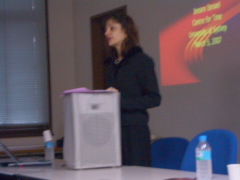

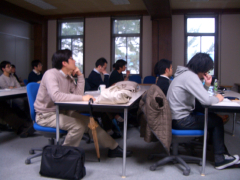
| PaSTA TOP | 趣旨 | メンバー | 研究会案内 | Newsletter | COE TOP |

PaSTA 及び「哲学系若手研究者育成プロジェクト」研究会の電子メール通知をご希望の方は研究員の佐野までご連絡下さい。
PaSTA 研究会は終了いたしました。
日程:3月05日(月)午後3:00〜5:00; 3月06日(火)午後3:00〜5:00
会場:京都大学文学部東館4階 COE研究室
講演:
Dr. Jenann Ismael(Associate Professor, University of Arizona, and QEII fellow, Centre for Time, University of Sydney)
3月05日: Freedom and Determinism
3月06日: Freedom, Compulsion, and Causation
Jenann Ismael 助教授に関しては、次の website: http://www.usyd.edu.au/time/people/ismael.htm, および, http://homepage.mac.com/centre.for.time/ismael/に紹介があります。




日時:2月20日(火)、時間: 午後3:30〜
会場:京都大学文学部東館4階 COE研究室
講演:
Prof. Goran Švob (University of Zagreb, Croatia)
`Logic, Frege, and Leibniz' (仮)
Goran Švob 教授に関しては、次の website: http://www.ln.edu.hk/philoso/Dr.Goran.htm に紹介があります。
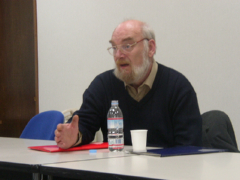

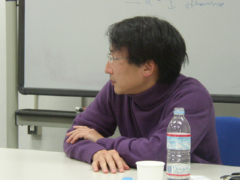
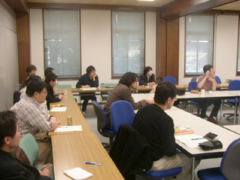
日時:7月22日(土)、時間: 午後2:00〜5:00
会場:京都大学文学部東館4階 COE研究室
講演:
Prof. Mark Siderits (Illinois State University)
“The Logic of Emptiness”
The central claim of the Madhyamaka school of Buddhism is that all things are empty, or lacking in intrinsic nature. But according to most Buddhist philosophers, only that which has intrinsic nature is ultimately real. And in order for the statement, ?All things are empty? to be true, it must correctly represent that which is ultimately real. So a consequence of the Madhyamaka claim is that the intrinsic nature of what is ultimately real is that it lacks intrinsic nature. This and related paradoxes have given rise to a variety of interpretations of the Madhyamaka position. One recent attempt at understanding the view is the dialetheist interpretation propounded by Priest and Garfield. According to dialetheism, some contradictions may be true. According to the dialetheist interpretation, Madhyamaka affirms such contradictions as ?The nature of things is to lack a nature?. I discuss and critically evaluate this way of understanding Madhyamaka.
Newsletter No. 18 により詳細な要旨を掲載しております。合わせてご覧ください。
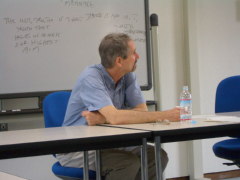

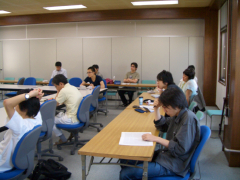
日時:7月16日(日)時間: 午後 2:00〜6:00
会場:京都大学文学部東館4階 COE研究室
講演:
「もしあなたが測定できないならば、あなたの知識は貧弱で不十分である。」W.トムソンのものとされるこの言葉が格言となった時代に、ベルクソンは神経の科学的研究が進めば、計算あるいは計測が適用できない新たなタイプのエネルギーが見つかるかもしれないとしばしば繰り返している。このミステリアスな概念の内実を、当時の科学や哲学の動向と背景(ブシネスク、マクスウェル、ブートルー、ニューロン研究など)と照らし合わせることで、探っていきたい。
TBA
ウィリアム・ジェイムズの『プラグマティズム』(1907年)の短い序を開くと、 そこにはプラグマティズムへの手引きとなる書物がいくつか列挙され、そしてフランス人としては、ミヨー(G. Milhaud)、ル・ロワ(E. Le Roy)、そしてブロンデル(M. Blondel)たちの名が記されている。そこにベルクソン──『プラグマティズム』仏訳に序文を寄せたジェイムズの友人──の名を加えてもよいだろう。しかし、いわゆる「フランス・スピリチュアリスム」のラベリングを受けがちなこうした思想家たちが、なぜ同時にプラグマティズムの先導者でもあったのか。その背景をさぐりつつ「プラグマティズム的運動」(ルネ・ベルトロ)という観点から、この時代のフランス哲学についていくぶんかの回顧を行いたい。
Newsletter No. 18 により詳細な要旨、及び、研究会での討議を振り返った先生方のコメントを掲載しております。合わせてご覧ください。
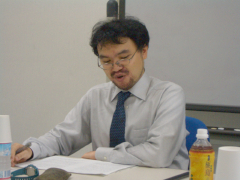
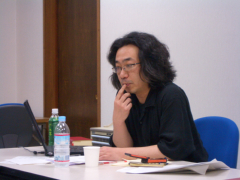
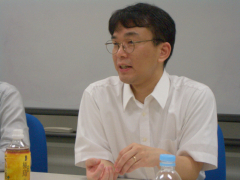
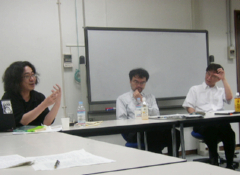

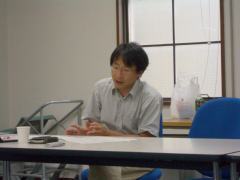


日時:7月8日(土)午後4:00〜6:30
会場:京都大学文学部東館4階 COE研究室
講演:
Prof. Danielle Macbeth (Haverford College)
“The Role of _Begriffsschrift_ in the Striving for Truth”
As Kant argues, mathematical knowledge seems to be at once a priori and ampliative. The task is to understand how it can be. The account I sketch draws first on the idea, derived from Kant, that a Euclidean demonstration or a calculation can yield new knowledge in virtue of the fact that the system of signs it employs involves primitive parts that combine into wholes that are themselves parts of larger wholes. Because wholes such as numerals and Euclidean figures both have parts and are parts of larger wholes, their parts can be recombined into new wholes in ways that extend our knowledge. I show that sentences of Frege's logical language can also be read as involving three such levels of articulation; because they have these three levels, we can understand in essentially the same way how a proof from concepts alone can extend our knowledge.

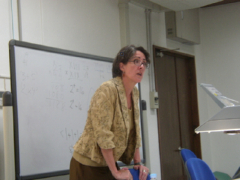

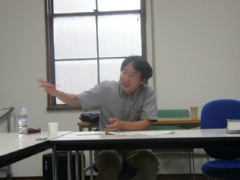

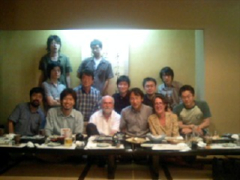
日時:6月25日(土)午後2:00〜6:00 (当日のプログラム)
会場:京都大学文学部東館4階 COE研究室
講演:
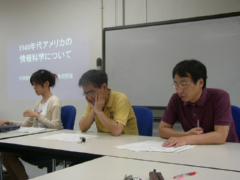
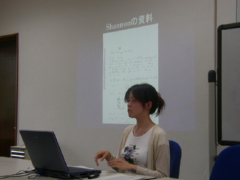
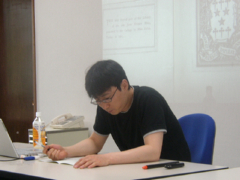
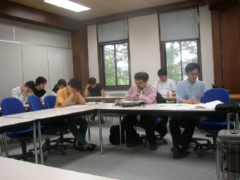

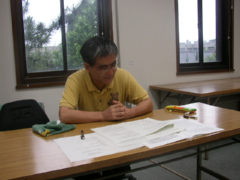
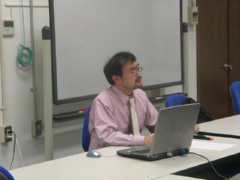
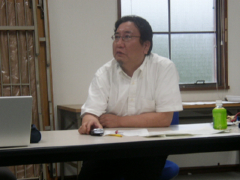

日時:4月21日(金)午後3:00〜6:00
会場:京都大学文学部東館4階 COE研究室
講演:
Prof. Graham Priest (Melbourne University)
“60% Proof : Lakatos, Proof, and Paraconsistency”
This paper discusses the notion of mathematical proof to be found in Imre Lakatos' Proofs and Refutations, which is very different from the usual foundationalist notion. I will discuss to what extent it applies in mathematics, and then turn to the question of proof in logic.
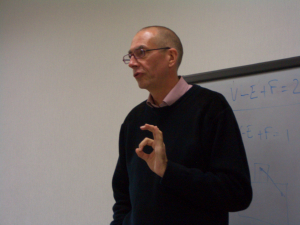
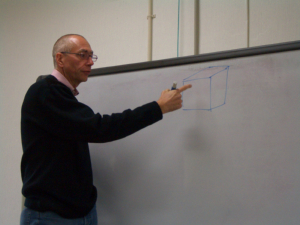
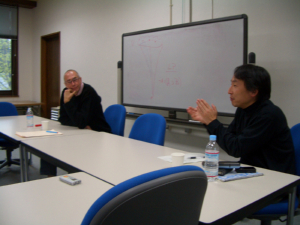
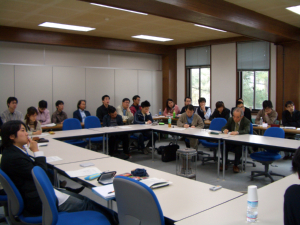
日時:4月11日(火)午後4:00〜6:30
会場:京都大学文学部東館4階 COE研究室
講演:
Prof. Alan Hajek (Australian National University)
“Philosophical Heuristics”
Chess players typically benefit from mastering various heuristics: 'castle early', 'avoid isolated pawns', and so on. Indeed, most complex tasks have their own sets of heuristics. Doing philosophy well can be a very complex task; are there associated heuristics? I find the grandmasters of philosophy repeatedly using certain techniques, many of which can be easily learned and applied. Some are pointers to where good arguments, or good counterexamples, may be lurking. Some suggest ways of generating new arguments from old ones. Some are heuristics for creating new arguments from scratch. Some provide self-defence against fallacies. These various techniques can especially help philosophers to be self-critical: they help you spot problems in your own work before others all too helpfully spot them for you.
I will identify many such techniques, each illustrated by numerous examples. Topics to be discussed include (time allowing):
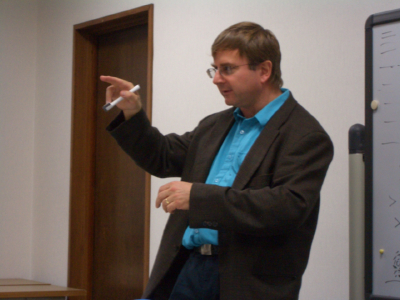

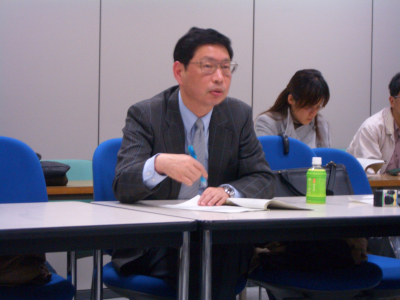
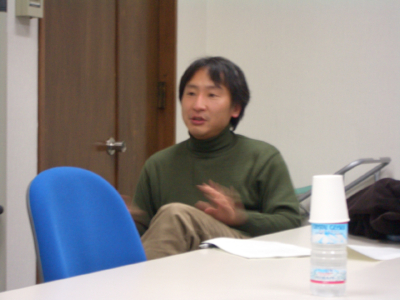
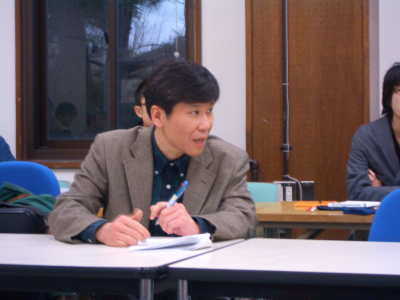
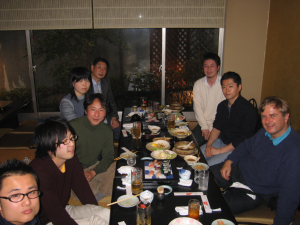
これより前の研究会については「2005年度までの研究会」のページを御覧下さい。